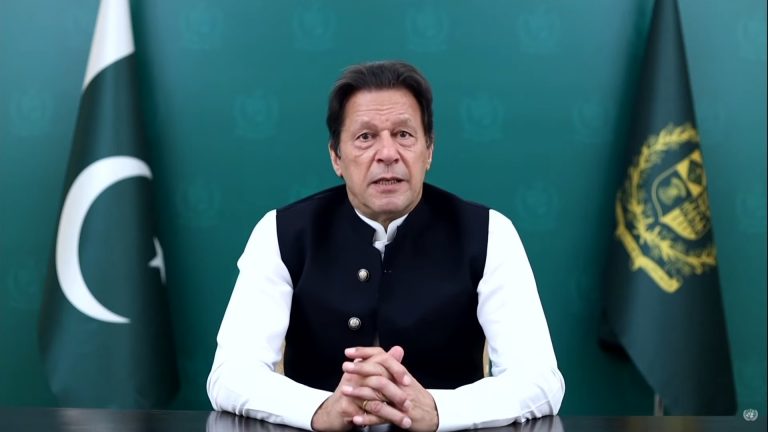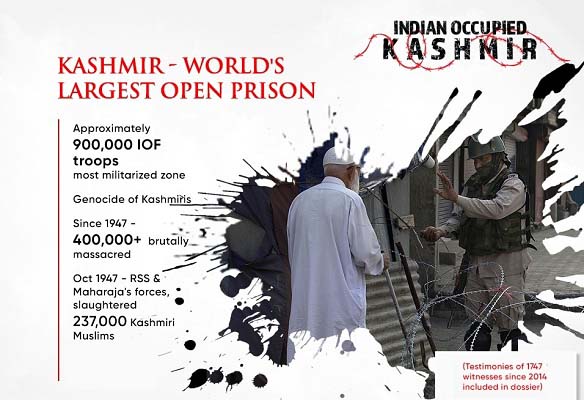‘Unfortunate’ of the world to ignore India’s ‘war crimes’ in Kashmir over corporate interests: PM

United Nations: Prime Minister Imran Khan has said India’s actions in Occupied Jammu and Kashmir amounted to “war crimes” and the “crimes against humanity” and regretted the world’s “selective” approach owing to its corporate interests.
“It is unfortunate, very unfortunate, that the world’s approach to violations of human rights lacks even-handedness, and even is selective,” the prime minister said in his address at the 76th session of the United Nations General Assembly.
Imran Khan said India was violating the international human rights laws including the 4th Geneva Convention and pointed that “geopolitical considerations and corporate interests” had compelled the major powers to overlook the transgressions of their “affiliated” countries.
“Such double standards are the most glaring in the case of India, where this RSS-BJP regime is being allowed to get away with human rights abuses with complete impunity,” he said.
Imran Khan said India had undertaken a series of illegal and unilateral measures in the Occupied Jammu and Kashmir since August 5, 2019.
He mentioned that India had unleashed a reign of terror by an occupation force of 900,000, jailed senior Kashmiri leadership and imposed a clampdown on media and the internet.

He said the abduction of 13,000 young Kashmiris, extra-judicial killing of hundreds of innocent Kashmiris in fake “encounters” and collective punishments by destroying entire neighbourhood and villages was a norm.
The prime minister said Pakistan had unveiled a detailed dossier on gross and systematic violations of human rights by the Indian security forces in Occupied Jammu and Kashmir.
“This repression is accompanied by illegal efforts to change the demographic structure of the occupied territory, and transform it from a Muslim majority into a Muslim minority,” he said.
Indian actions violate the resolutions of the UN Security Council on Jammu and Kashmir.
Khan said the resolutions clearly prescribed that the “final disposition” of the disputed territory should be decided by its people, through a free and impartial plebiscite held under the UN auspices.
The prime minister recalled that the most recent example of Indian barbarity was the forcible snatching of the mortal remains of the great Kashmiri leader Syed Ali Shah Geelani from his family, denying him a proper Islamic funeral and burial.
“Devoid of any legal or moral sanction, this action was even against the basic norms of human decency,” he said.
He called upon this General Assembly to demand that Syed Geelani’s mortal remains be allowed to be buried in the “cemetery of martyrs” with the appropriate Islamic rites.
Imran Khan said the onus remained on India to create a conducive environment for meaningful and result-oriented engagement with Pakistan.
For this, he said, India must “reverse its unilateral and illegal measures instituted since August 5, 2019”.
He asked India to stop its oppression and human rights violations against the people of Kashmir and reverse the demographic changes in the occupied territory.
He drew the attention of the global community towards India’s massive military buildup with nuclear weapons, saying the situation could “erode mutual deterrence” with Pakistan.
“India’s military build-up, development of advanced nuclear weapons, and acquisition of destabilising conventional capabilities can erode mutual deterrence between the two countries,” he said.
The prime minister said it was “essential to prevent another conflict between Pakistan and India”.
He said Pakistan desired peace with India as with all its neighbours, however, stressed that sustainable peace in South Asia was contingent upon resolution of the Jammu and Kashmir dispute, in accordance with the relevant United Nations Security Council resolutions, and the wishes of the Kashmiri people.
He recalled that Pakistan reaffirmed the 2003 ceasefire understanding along the Line of Control with a “hope that it would lead to a rethink of the strategy in New Delhi”.





